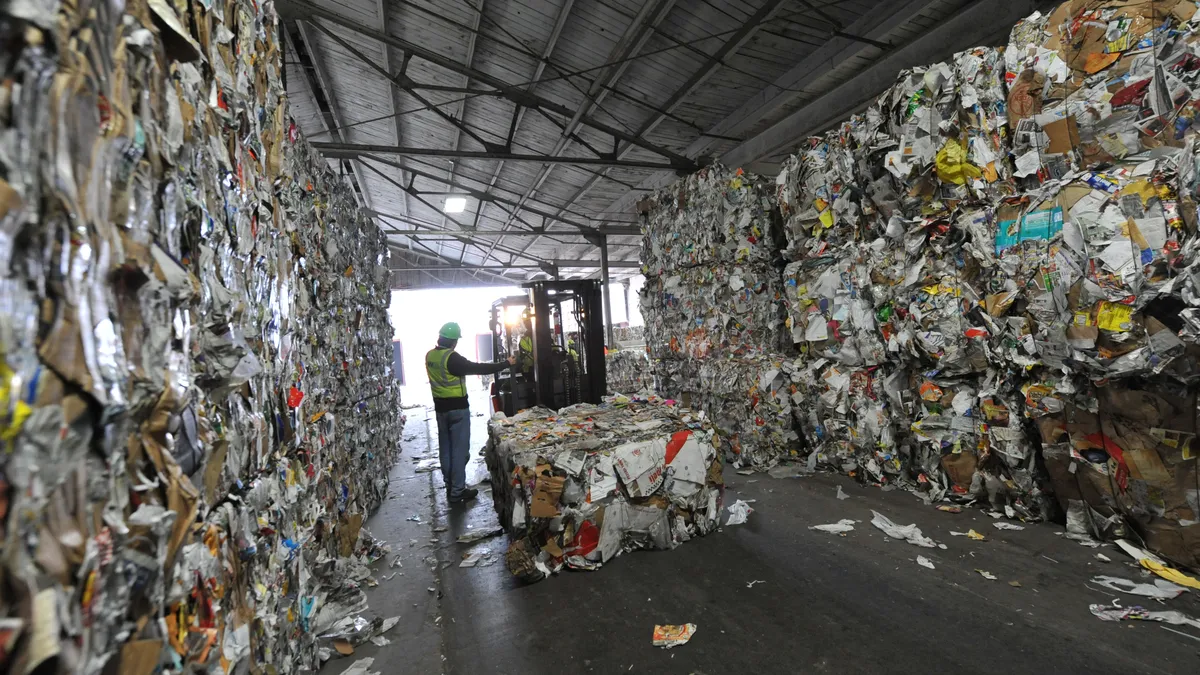UPDATE: April 15, 2020: As You Sow recently agreed to withdraw a shareholder proposal following an agreement by Republic Services to report new recycling information. That reporting will cover details on the company's collection, processing, and marketing of plastics, including information on gaps in current infrastructure and recommendations to fix them. The company will also share an assessment of its MRF capabilities and efficiencies, with information on the level of automation or new technology across facilities.
Dive Brief:
- Waste Management has agreed to release a range of new information on its recycling infrastructure, markets and policy positions following a shareholder proposal by Trillium Asset Management and advocacy group As You Sow. The groups have withdrawn their resolution as a result.
- The company has committed to releasing a report on its recycling infrastructure for plastics in the United States, including regional maps and end market data for PET, HDPE and polypropylene. Waste Management is also expected to share non-proprietary information about how many of its MRFs have newer processing equipment that can improve material yields and how many are scheduled for upgrades.
- Additionally, Waste Management has agreed to release an updated policy statement on extended producer responsibility (EPR). A similar As You Sow proposal is still pending with Republic Services, with the exception of no requested language around EPR.
Dive Insight:
This is the first time such resolutions have been filed with Waste Management or Republic around specific recycling issues. Shareholder advocacy attention around these topics is more commonly directed toward consumer product companies, retailers and foodservice chains. As attention around plastics in particular continues to grow, the groups felt it was time to start asking more questions about the quality of recycling systems at all levels of the supply chain.
Conrad MacKerron, senior vice president of As You Sow, called Waste Management's agreement to release new information "laudatory" and said the discussion played out amicably in recent weeks.
“I think it’s all part of creating this impression that they are taking proactive steps here because of the increased concerns about the state of recycling," he told Waste Dive.
Following similar questions last year, Waste Management joined multiple others in confirming it no longer exports residential plastics to international markets. Asked why it agreed to release this information now, Waste Management spokesperson Janette Micelli told Waste Dive the company was "already developing much of it as part of our ongoing sustainability efforts, and our efforts to enhance recycling." Micelli said this new reporting is targeted for a June release.
She also confirmed Waste Management's current position is the one reflected in its corporate governance materials online, which states the company "does not support expansion of EPR beyond hard-to-handle materials to traditional recyclables, around which a competitive U.S. recycling system and infrastructure has been built." Waste Management regularly notes this stance in its annual 10-K filings, cautioning that EPR "could have a fundamental impact on the waste, recycling and other streams we manage and how we operate our business, including contract terms and pricing."
This position was reflected in opposition to a major California bill last fall that would have paved the way for such a system. Allan Pearce, a shareholder advocate at Trillium, told Waste Dive this stance was among the reasons they requested a more updated position.
"Recognizing Waste Management’s influential role as one of the leading recycling companies in the country, Trillium was concerned to learn the company lobbied against a landmark EPR bill in California," Pearce wrote via email. "So, Trillium urged Waste Management to use its unique voice to constructively participate in the public policy process as a way to help improve recycling rates in the U.S."
Trillium is not involved in the Republic proposal, as it does not own any stock in the company, but Pearce noted the other company's supportive stance on the California bill. Republic Services declined to comment on the status of its own discussions with As You Sow or the company's current stance on EPR. MacKerron said discussions are ongoing.
EPR for packaging has become an increasingly common topic of discussion, with numerous states such as Maine at various stages of discussion and a national bill proposed earlier this month. This comes as a new report from Greenpeace questions recyclability claims for many plastics due to infrastructure and market gaps, and groups such as The Recycling Partnership are calling for substantial investments to boost the system long-term.
As the nation's largest residential recyclers, Waste Management and Republic have both committed to further recycling investments – as they continue to rework the business model – but also note they can't do it alone. As You Sow agrees.
“The collectors like Waste Management and Republic can’t by themselves spark the whole processing industry. That really needs to be financed by the brands and that’s why we think EPR is so important," said MacKerron, calling for action on a "bigger, more organized scale" than just being a backer of groups such as The Recycling Partnership or Closed Loop Partners.
In MacKerron's view, a question that many brands have not satisfactorily answered yet is: "How are you serving as a real catalyst to expand processing of these materials that you want back and that you want for recycled content?"
As both brands and recycling companies work toward their own sustainability targets, amid a rapidly changing policy and societal landscape, these questions are likely to come up more often in the years ahead.











